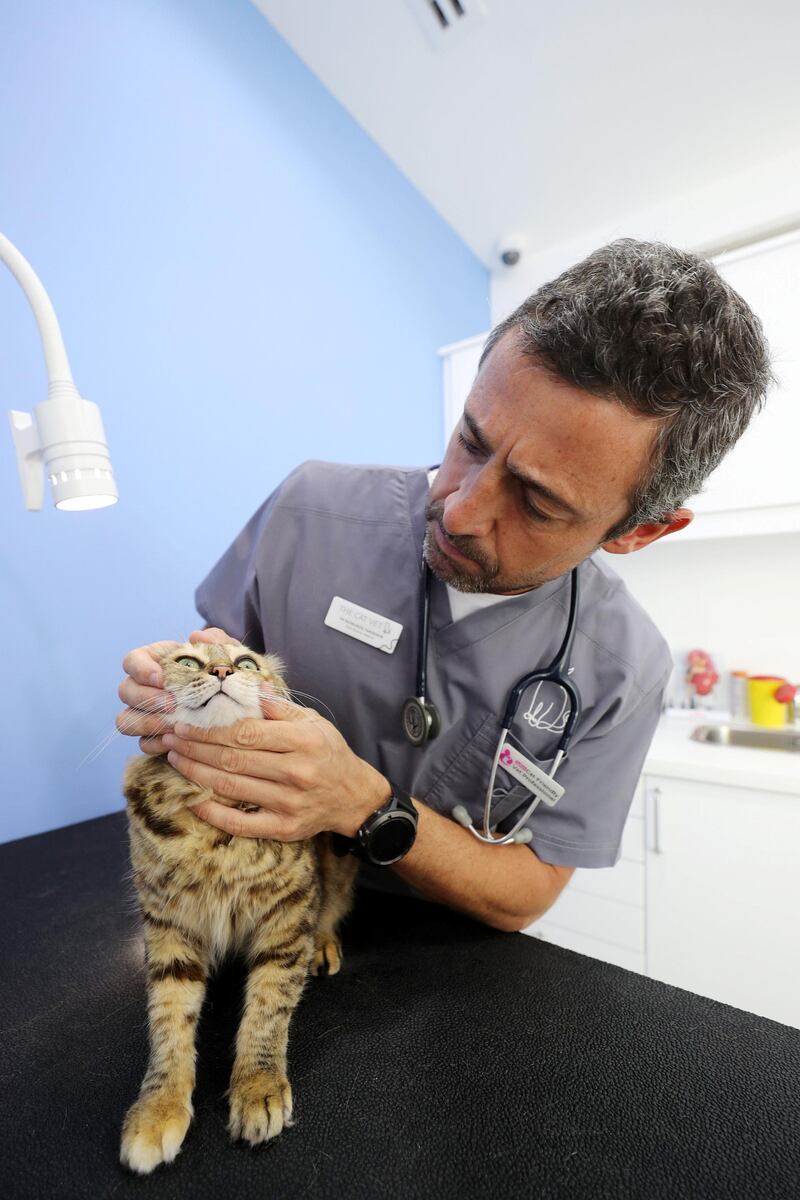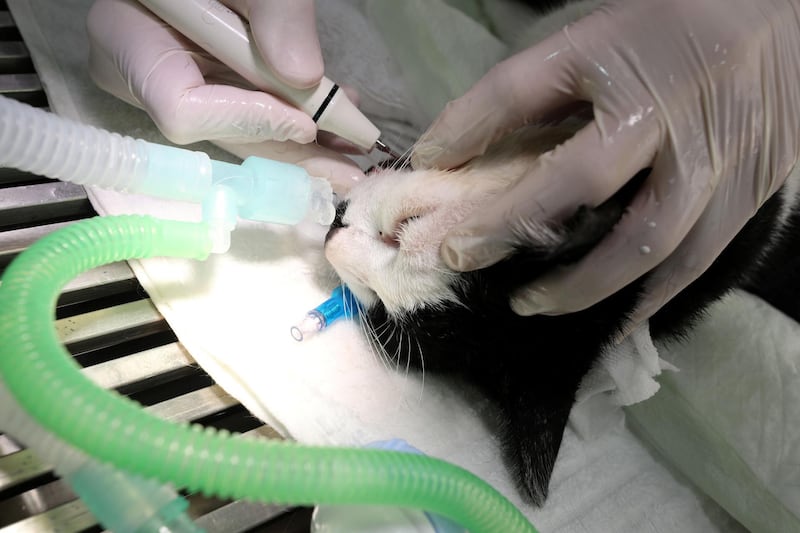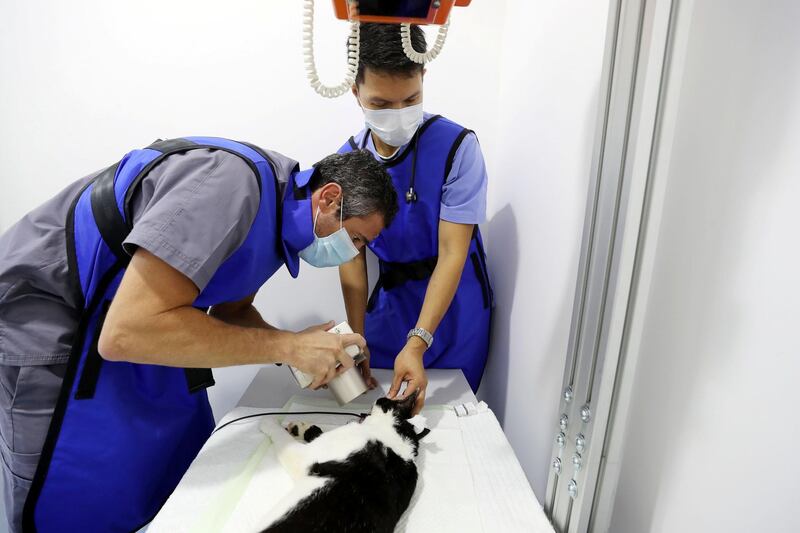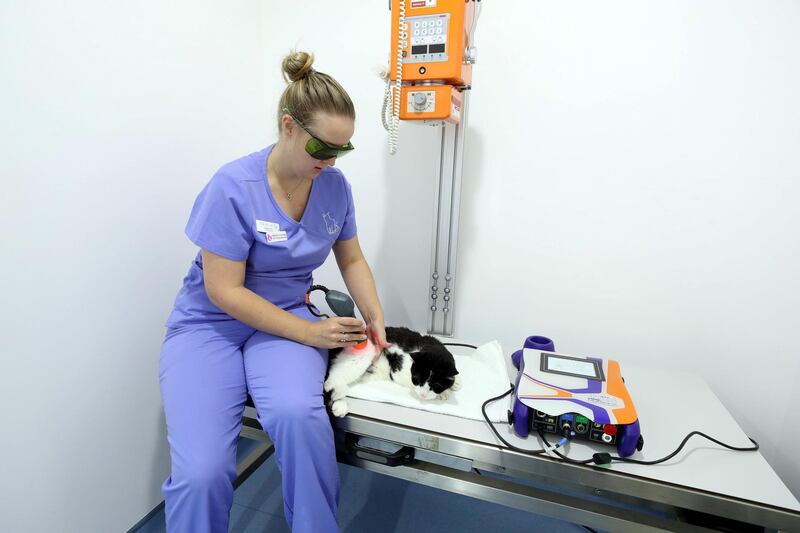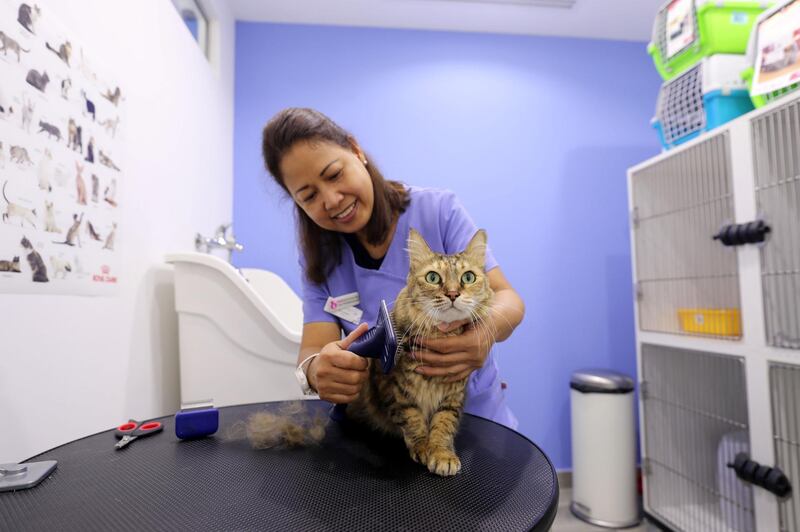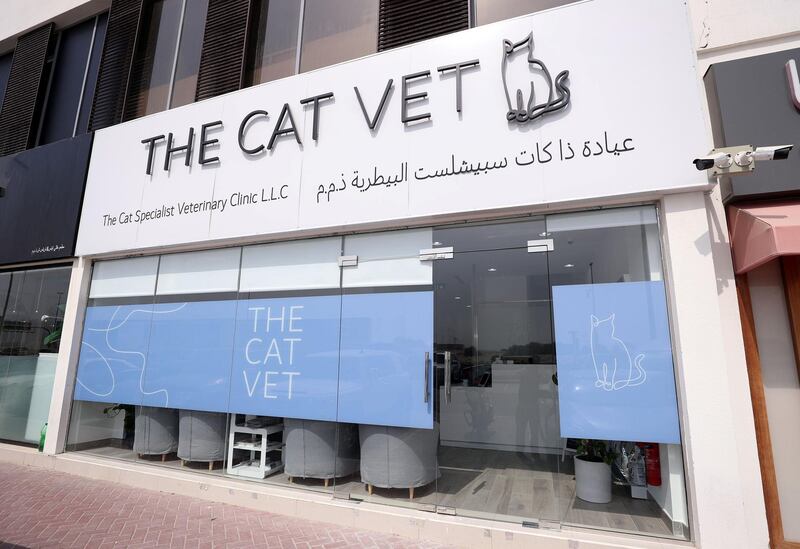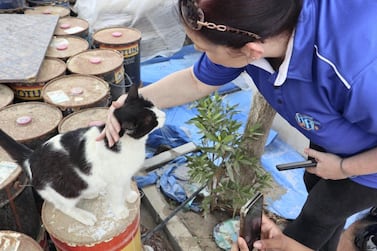From the moment an appointment is booked at The Cat Vet, the latest addition to Dubai's veterinary scene and the UAE's first cat-only clinic, the difference is palpable. Staff email out a series of tips owners can employ at home to make the trip in less stressful for everyone. It includes putting the cat carrier in the living room ahead of time, placing food or a blanket inside it, and covering the carrier with a towel for the car ride to block out any upsetting stimuli.
Giving cats room to adjust
Once at The Cat Vet, the carriers are placed on cat stands and covered with blankets, rather than being left on the floor or the counter. There is no disturbing barking or distracting panting, calming pheromones are diffused throughout the clinic and relaxing music plays in the background. Appointments are also longer, meaning the vet gathers information from owners while the cat acclimatises to its new environment. "We open the box, they come whenever they want," says Dr Raimundo Tamagnini, a veterinarian and the clinic's founder and director.
There were several compelling reasons to open a cat-only clinic in the UAE, he adds. Everything can be purchased in smaller sizes, with less variation – so the business investment is smaller. There are many more cats in the UAE than dogs. And then there is the kicker, one many frustrated cat owners can understand: “More than 50 per cent of cats have problems with going to the vet. They don’t like the environment,” says Tamagnini, who studied veterinary medicine in Portugal and earned his postgraduate degree from the University of Sydney.
His new clinic even makes house calls. “Although we have ways of reducing the stress of cats, sometimes they are so stressed, it’s better to fix them at home,” he says. “Some people don’t have a car, it’s too hard in the taxi; or when it’s four or five cats that all need vaccinations, it’s better for one vet and a nurse to go.”
Cats form attachments, too
Cats have long been a favourite in this region. Ancient Egyptians revered them and the Prophet Mohammed was reportedly a fan, too. There are many stories about his affection for cats, but as one goes, when the Prophet Mohammed found his favourite cat, Muezza, sleeping on part of his prayer robe, he cut off the robe’s sleeve rather than disturb the feline’s slumber.
For years, cats have been perceived as inferior to dogs in terms of loyalty and affection, but that seems to be changing. A study conducted at Oregon State University and published in the journal Current Biology, reports that for the first time, researchers have been able to demonstrate that cats have the same attachment capabilities as children and dogs. After watching 70 kittens, the team found that 64 per cent demonstrated a "secure attachment" when interacting with their owners.
"Our study indicates that when cats live in a state of dependency with a human, that attachment behaviour is flexible and the majority of cats use humans as a source of comfort," says Kristyn Vitale, a researcher in the College of Agricultural Sciences Human-Animal Interaction Lab.
Stimulating a cat is important
Since 2011, animal behaviourist Jackson Galaxy (real name Richard Kirchner) has starred on the Animal Planet show My Cat From Hell, armed with an encyclopedic understanding of the cat psyche, 10 years of experience working in an animal shelter and a guitar case full of toys. Galaxy has also written several bestselling books on cats and the process of "catification", which involves making cat-friendly adjustments to any home. "There are no bad cats," he's fond of saying. "Just bad owners."
Tamagnini agrees that owners don’t take enough responsibility for making sure their cat is happy and challenged: there is a lot more involved in their care than putting out a dish of food and making sure the litter is clean. “They are half-wild animals,” he says. “Dogs are much more connected with man, and being part of a family and a home, rather than cats. Cats still need to bring their intelligence.”
A "catified" house would feature a variety of hiding places, elevated perches, steps and ladders, "so they can move around; they jump and they hunt and they play and they chase". There is much that can be done, Tamagnini explains, to cater to a cat's need for adventure, challenge, affection and security. "There are people who walk their cats, who can even walk them on a leash on the street," he says.
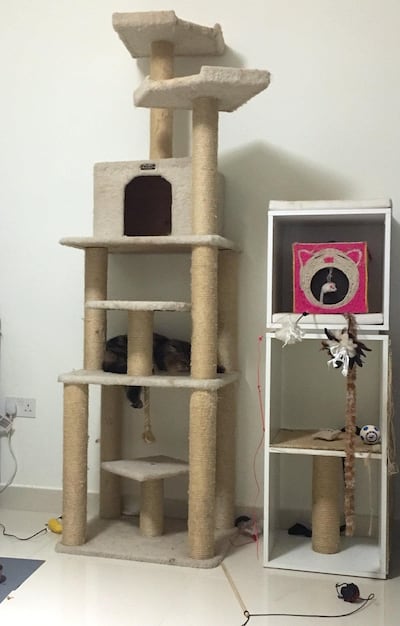
When owners don't take those steps, it leads to a common problem Tamagnini sees in Dubai: feline obesity. "They are neutered, they live in apartments, they live very often on their own," he says. "They are not stimulated, the owner doesn't play with them. The owner doesn't bring out their natural behaviour."
That’s why The Cat Vet’s staff tries to teach owners that mealtime should be used to create a challenge for the animal. “You hide food, you have toys for them to play with, you hide it inside the toy,” says Tamagnini. “So mentally and physically they are active, they have to fight and play to eat.”
Owners also need to learn more about interpreting their cat's actions and verbal cues. For example, a meowing cat does not always mean a demand for food. "She very often wants to ask: 'Hi, how are you?'," Tamagnini explains. "But she is getting food. That's a misunderstanding."
Teaching a cat tricks
Cats are increasingly seen on social media these days demonstrating a variety of mind-boggling tricks, everything from moonwalking to pushing trolleys to giving multiple high fives.
The Cat Vet’s Dr Raimundo Tamagnini believes it would take a special combination of patient owner and willing cat to make those sorts of tricks happen. That is due to the more random nature of cats, who can’t be characterised or defined by breed, as dogs can.
“They are very individual,” he says. “They do mostly what they want, at the times that they want, with whoever they want.”
If you do want to try to teach your old cat some new tricks, there are several dedicated animal behaviourists working online who can guide you through a process called "clicker training". This involves the sound of a click either made verbally, by click pen or a clicker stick, to identify a behaviour, followed by a treat for the cat as a reward. Bonus: their social media accounts beat @CatsofInstagram any day.
Former dog-trainer Julie Posluns changed course when a black cat she named Jones turned up on her Toronto doorstep. Cue a bow tie and videos featuring a pliable Jones demonstrating an astonishing variety of tricks: his high-stepping chorus line kicks are a true highlight. Through Catschool.co, Posluns sells information booklets, special cat clickers and guide sticks and offers online support.
Trisha Seifried started out her career as an animal trainer at Sea World and Busch Gardens before moving on to work on dog and cat performance teams at Purina Farms, a family-friendly pet attraction in St Louis, Missouri. Her website offers programming that guides owners through a variety of behaviour training. The recent Instagram video of Chow Chow moonwalking is particularly impressive.
The Cat Vet is in the Raa building on Hessa Street in Dubai. More information is at www.thecatvet.ae, appointments can be booked on 800 228 838
